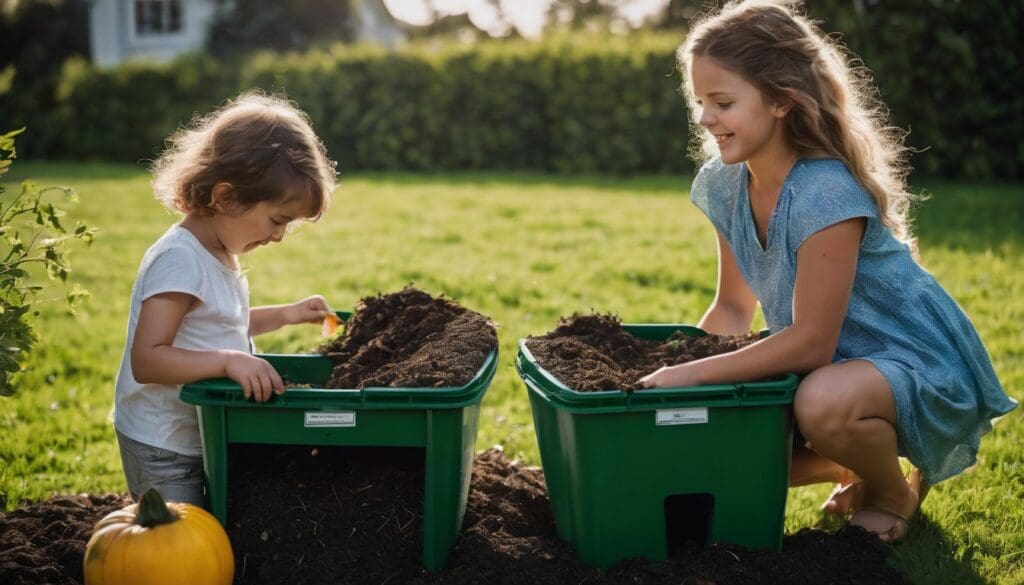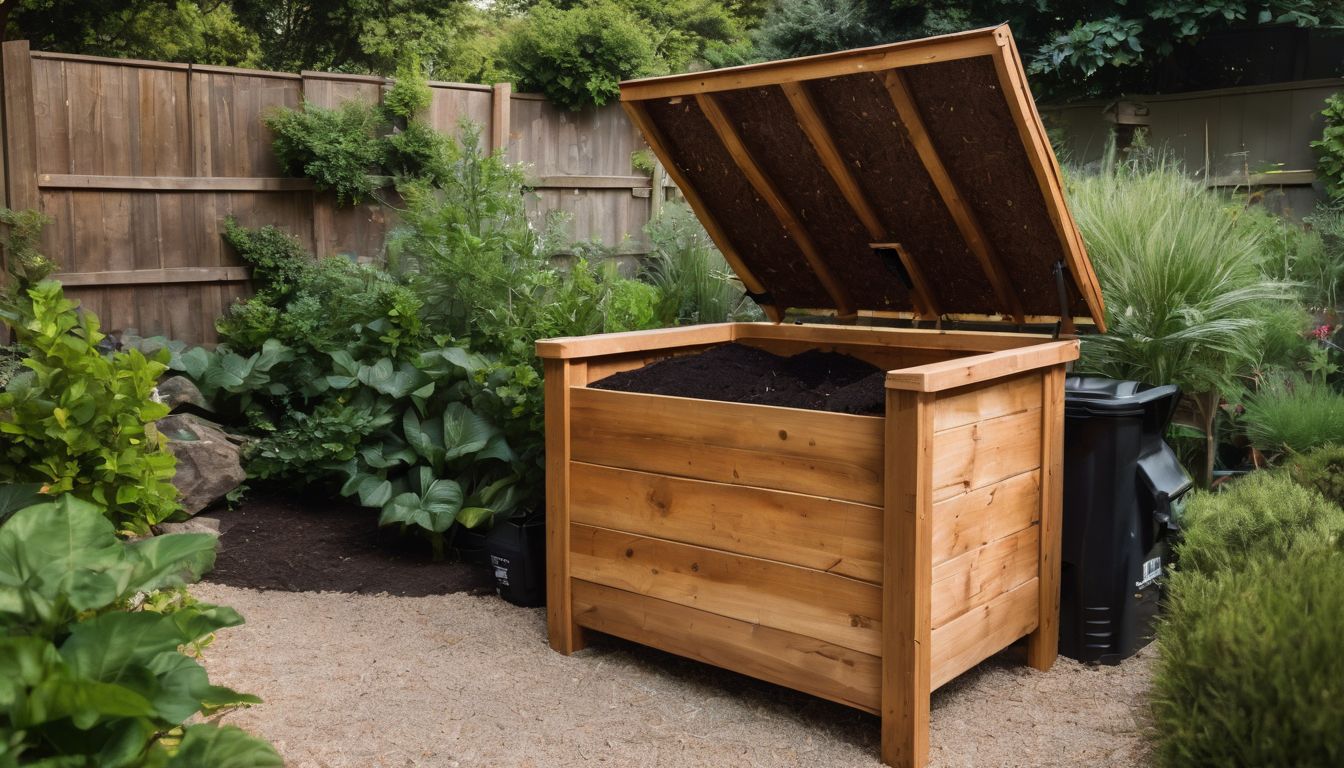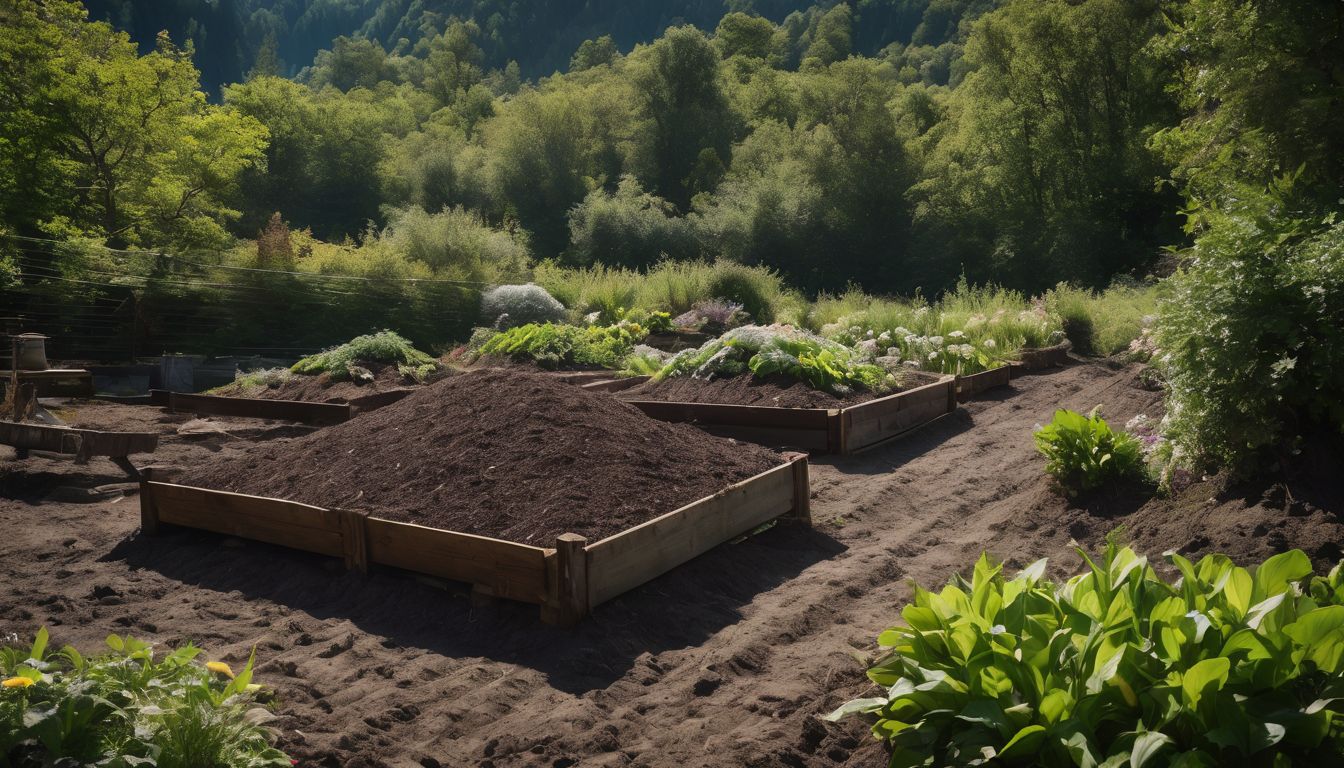In our busy world, it’s easy to overlook the waste we create every day. Did you know that organic waste like peels and leftovers can become a resource instead of rubbish? This blog will guide you through turning kitchen scraps into garden gold with your little ones.
Let’s dig in and teach our kids the cycle of composting!
Key Takeaways
- Children learning about composting can reduce waste, save money for schools, and help the environment by creating nutrient-rich soil from organic leftovers.
- Through activities like setting up a compost bin or participating in gardening projects, children get hands-on experience that teaches them about sustainability and science.
- Educators have resources such as the “Crazy for Composting” guide and “A Garden for Every Child” to effectively teach pupils the benefits of composting.
- Schools practising composting encourage community involvement and provide real-world understanding of eco-friendly initiatives to pupils.
- By making composting part of their lives, children develop responsible habits early on which supports a sustainable future.
Why Teach Kids About Composting?
Teaching kids about composting is essential for reducing waste, promoting a sustainable lifestyle and making a positive impact on the environment. It’s an important lesson in environmental stewardship and helps children understand the value of organic waste management.
Importance of reducing waste
Reducing waste plays a crucial role in promoting sustainable living. When kids learn to cut down on what they throw away, they take active steps towards environmental stewardship. It not only preserves natural resources but also minimises the strain on landfills and reduces pollution.
Smart management of organic waste through composting turns scraps into valuable soil health boosters, closing the nutrient cycle in an eco-friendly way.
Encouraging children to embrace waste reduction helps instil an early sense of responsibility for their actions’ impact on the world. Simple habits like reusing, recycling, and composting contribute to sustainability and show commitment to conservation efforts.
In schools and homes alike, fostering such practices ensures we leave breathable air, drinkable water, and fertile ground for generations to come. Demonstrating these acts of green living tangibly improves our environment while teaching kids life-long skills in environmental education and stewardship.
Impact on the environment
Composting has a significant impact on the environment by reducing waste and promoting soil enrichment. It plays a crucial role in nutrient cycling, supporting sustainable practices and eco-friendly initiatives.
By teaching kids about composting, we instil a sense of responsibility towards creating a positive environmental impact from an early age. This leads to the development of environmentally conscious individuals who actively participate in supporting conservation efforts.
Gardening with kids through composting also encourages them to understand the importance of sustainable practices and empowers them to contribute towards making our planet greener for future generations.
Promoting a sustainable lifestyle
Promoting a sustainable lifestyle involves teaching children the value of reducing waste and embracing eco-friendly practices. Educating kids about composting instills a sense of responsibility towards the environment, encouraging them to actively participate in soil enrichment and gardening.
By incorporating sustainability curriculum and hands-on learning activities, we empower the next generation to make positive choices for the planet.
Engaging in gardening with kids and promoting eco-friendly initiatives at an early age helps foster a mindset that values environmental conservation. Introducing composting benefits not only enriches soil and reduces waste but also instils a deeper understanding of how individual actions contribute to the greater good.
How to Teach Kids About Composting
Engage kids in hands-on activities such as creating a mini compost bin or participating in composting experiments. Connect the concept of composting to science and gardening lessons to make it more relatable and educational for them.
Hands-on activities
Teaching kids about composting through hands-on activities is crucial for their understanding and engagement. Here are some effective ways to implement hands-on learning:
- Setting up a small compost bin in the school garden or classroom to allow kids to observe the decomposition process firsthand.
- Organising a waste audit where students collect and categorise different types of waste, emphasising the importance of reducing and separating organic materials for composting.
- Creating a compost pile together, allowing children to actively participate in turning the pile and monitoring its progress.
- Involving students in building and maintaining a worm composting system, teaching them about the role of worms in breaking down organic matter.
Using a compost bin
Kids can learn to compost by using a compost bin in these simple steps:
- Choose the right location for the compost bin, ensuring it’s easily accessible and away from direct sunlight.
- Layer brown and green materials like fruit peels, grass clippings, and shredded paper to create a balanced mix.
- Turn the contents regularly to aerate the compost, promoting decomposition and preventing odors.
- Add water when necessary to keep the compost moist but not soggy.
- Monitor the temperature of the compost pile to ensure it stays within the ideal range for decomposition.
- Harvest mature compost when it has a dark, crumbly texture and an earthy smell, ready to nourish your garden.
Connecting it to science and gardening lessons
Connecting composting to science and gardening lessons allows children to learn about the biological processes that occur in a compost pile. It also provides an opportunity for them to understand how organic waste breaks down into nutrient-rich soil.
- Teach children about the carbon and nitrogen cycle through composting, demonstrating how organic materials decay and become valuable resources for plants.
- Incorporate experiments that explore decomposition, introducing concepts of microorganisms, heat production, and the role of oxygen in the composting process.
- Connect composting to gardening by involving kids in planting and maintaining a garden fed by compost, demonstrating the direct benefits of their efforts in creating fertile soil.
Benefits of Composting for Schools
Composting in schools reduces waste and costs, provides educational opportunities, and encourages collaboration and community involvement. Read more about the importance of teaching kids about composting and how to do it effectively.
Reduced waste and cost
By composting at schools, waste can be significantly reduced, leading to cost savings for educational institutions. Implementing composting initiatives allows schools to divert organic waste from landfills, reducing the amount of rubbish that needs to be hauled away and disposed of.
This not only positively impacts the environment but also minimises the expenses associated with waste management.
Incorporating composting practices into school curriculums offers an opportunity for students to actively participate in eco-friendly initiatives while simultaneously instilling a sense of responsibility towards environmental conservation.
Educational opportunities
Kids who participate in composting initiatives have the chance to learn about sustainability and environmental responsibility firsthand. They can explore hands-on activities that connect them to the natural world while also boosting their scientific knowledge.
Through these experiences, they gain a deep understanding of the impact their eco-friendly practices can have on reducing waste and promoting a greener future.
Schools that implement composting programmes not only reduce their waste but also create valuable educational opportunities for students. These initiatives foster collaboration, community involvement, and critical thinking skills as students actively engage in environmentally friendly practices.
Collaboration and community involvement
Schools can collaborate with local composting facilities to provide hands-on learning experiences. Students can visit these facilities, learn about the composting process, and even volunteer their time to gain a deeper understanding of eco-friendly practices.
Additionally, schools can involve the community by organising composting workshops or events where students and parents work together to create and maintain compost bins on school grounds.
This kind of collaboration fosters a sense of environmental responsibility among students and enables them to make a tangible impact in their community.
Encouraging collaboration between schools and local businesses creates opportunities for real-world learning experiences. By partnering with local farms or community gardens, students can see firsthand how their efforts make a difference in reducing waste and promoting sustainable practices.
Resources and Tools for Educators
Includes a “Crazy for Composting” educator guide, free copy of “A Garden for Every Child,” and various videos and pdf downloads to help educators teach kids about composting in an engaging way.
“Crazy for Composting” educator guide
The “Crazy for Composting” educator guide offers a comprehensive resource for teaching kids about composting in an engaging and effective manner. With clear instructions and hands-on activities, this guide helps educators incorporate eco-friendly practices into the curriculum while promoting environmental awareness.
It includes interactive lesson plans, fun experiments, and creative projects that make learning about composting enjoyable for students. The guide also emphasises the importance of reducing waste and nurturing a sustainable lifestyle, making it an essential tool for instilling eco-friendly initiatives in young minds.
In addition to providing practical tips for setting up a classroom compost bin, the “Crazy for Composting” educator guide connects composting to science and gardening lessons. By integrating these concepts, educators can demonstrate the impact of composting on the environment while fostering a deeper understanding of ecological balance.
Free copy of “A Garden for Every Child”
Get a free copy of “A Garden for Every Child” to inspire eco-friendly practices in children. This resource offers practical guidance for educators, promoting hands-on learning and connecting kids with nature through gardening.
With engaging content, this resource encourages the next generation to embrace sustainable lifestyles and take active roles in environmental conservation efforts.
This educational tool provides valuable information on how to cultivate an appreciation for eco-friendly initiatives from an early age. By incorporating the principles outlined in “A Garden for Every Child,” educators can empower students to become advocates for responsible waste management and conservation practices.
Videos and pdf downloads
Teaching resources for composting are valuable tools in educating environmentally conscious individuals. These resources provide engaging and informative content to support conservation and eco-friendly practices. Educators can take advantage of the following materials:
- Videos help visually illustrate the composting process, making it easier for kids to understand how organic waste turns into nutrient-rich soil.
- PDF downloads offer printable guides and worksheets that complement hands-on activities, allowing kids to further explore the concept of composting.
- The “Crazy for Composting” educator guide provides comprehensive lesson plans and activity ideas to integrate composting education into the curriculum.
- “A Garden for Every Child” is a free resource offering inspiration and practical tips for starting a school garden linked with composting initiatives.
Conclusion
Inspiring the next generation to care for the environment and make a positive impact is crucial. By teaching kids about composting, we can help them develop eco-friendly practices and support conservation efforts.
Inspiring the next generation to care for the environment and make a positive impact.
Encouraging kids to compost fosters a sense of responsibility towards the environment and instils eco-friendly practices from a young age. Hands-on learning experiences with composting promote an understanding of how waste reduction positively impacts the planet, which in turn builds a foundation for future environmentally conscious individuals.
By engaging in eco-friendly initiatives like composting, the next generation can actively contribute to supporting conservation and environmental sustainability.
Introducing kids to composting empowers them with practical knowledge and skills that will drive their commitment towards sustainable living. Through these efforts, we cultivate a community that values eco-friendly practices as essential components of everyday life.
FAQs
1. What is composting for kids?
Composting for kids involves teaching young people eco-friendly practices through hands-on learning, where they discover how to turn kitchen and garden waste into rich soil.
2. Why should children learn about composting?
Educating children on composting gives them vital knowledge about eco-friendly initiatives and equips them with the skills to contribute positively to our environment from an early age.
3. Can school projects include composting activities?
Yes, schools can incorporate composting as part of their curriculum under ecofriendly practices, offering a practical experience that supports children’s understanding of sustainability.
4. How do we make sure the next generation keeps up the habit of composting?
By engaging in fun and educational hands-on learning experiences, we can inspire lasting interest in composting among kids, encouraging them to maintain these ecofriendly habits as they grow.





